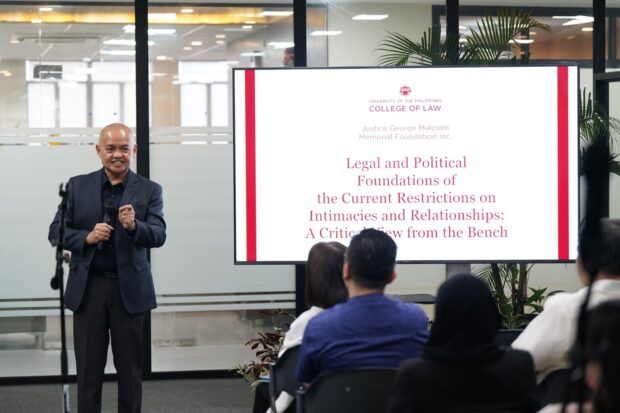Leonen: Our law makes it hard for couples to leave unhappy marriages

Senior Associate Justice Marvic M.V. F. Leonen talks on law and relationships, love and inclusivity. Photo from SC PIO
MANILA, Philippines — The Supreme Court has issued several decisions recognizing the fact that living realities of couples and their children are far from ideal.
However, Senior Associate Justice Marvic M.V.F. Leonen said the law has made it difficult for Filipinos to move out of unhappy marriages.
The magistrate mentioned this during his lecture titled “Legal and Political Foundations of the Current Restrictions on Intimacies and Relationships: A Critical View from the Bench” delivered last February 14, 2024 at the University of the Philippines (UP) College of Law in Diliman, Quezon City.
Aside from divorce, Leonen also discussed various kinds of relationships, the complexities of marriage, legitimacy of children and annulment.
“Marriage as the foundation of the family no longer reflects the present realities and sensitives of many Filipino families,” he said.
Article continues after this advertisementHe lamented that the Philippines remains the only country outside the Vatican with no absolute divorce law available for its citizens.
Article continues after this advertisementBefore the Spanish colonial period, he said the Philippines did have divorce laws.
Only during the Spanish colonial period when absolute or no-fault divorce was prohibited in the Philippines.
However, he said Spain had already changed their law decades ago while the Philippines remains stuck in an “antiquated form from our colonial past.”
“The antiquated form from our colonial past is still codified in our laws and is still being reiterated in jurisprudence 135 years later,” he pointed out.
Currently, there are pending bills allowing divorce in the country. However, there are no indications that it will be passed soon.
READ: ‘2023 na, wala pa ring divorce’: Three senators push for divorce bill passage
However, he noted that divorce is allowed in Muslim marriages under Shari’ah Law and as in marriages between a Filipino and a foreigner under Article 26 of the Family Code of the Philippines.
“Perhaps if we truly want justice, we will see how antiquated our laws are. If we truly are for justice, we will feel how we impose a burden that is a vestige of our colonial past, that even our colonizer chose to no longer impose on their own people,” he said.
The magistrate urged the UP College of Law faculty members and law students “to read our law from different lenses, from more contemporary ones. We must construe law knowing that our freedoms should be individually and socially meaningful.”
“Many of our people suffer during our watch, and while we all still exist, let us not fail them,” he added.
He also reminded the public that: “To be different from the hegemonic definition of what humans should be is not illegitimate.”
“We should not pathologize them with words like psychological incapacity. They are not illegitimate. The capacity to love is a human capacity. You are not less human just because you find love in the same biological sex. You are not less human if you want a relationship that is different from marriage. You are not less human if your premise with another is that there is no forever but you can work to be with each other for as long as you both can. xxx Make love real for all our people,” he said.